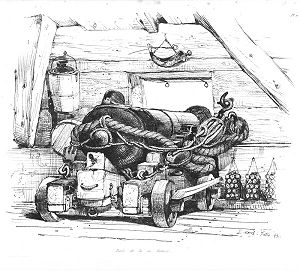36-pounder long gun
| 36-pounder long gun | |
|---|---|

36-pounder at the ready. Engraving by Morel-Fatio.
|
|
| Type | naval gun |
| Place of origin | France |
| Service history | |
| Used by | France |
| Production history | |
| Unit cost | 1760 Francs |
| Specifications | |
| Weight |
3.250 kg |
| Barrel length | 2.865 metres |
| Crew | 14 men (1 gun chief, 12 gunners, 1 boy) |
|
|
|
| Calibre | 174.8 mm |
| Muzzle velocity | 450 m/s |
| Effective firing range |
Maximum: 3700 metres |
3.250 kg
Maximum: 3700 metres
The 36-pounder long gun was the largest piece of artillery mounted on French warships of the Age of Sail. They were also used for Coastal defence and fortification. They largely exceeded the heaviest guns fielded by the Army, which were 24-pounder long guns. The nominal weight of shot was 36 French livres, 17.6 kg (38.8 lb).
Installed on the lower deck of the larger warships, the 36-pounder long gun was the largest caliber used in the Navy of the Age of the Sail. Attempts to use 48-pounders were made, for instance on Royal Louis, but these proved impractical to use on ships, partly because their weight allowed for only a few pieces, and because the heavy balls were unwieldy to load by hand. However, some coastal batteries fielded 48-pounders and even 64-pounders.
In the Royal Navy, a similar role was fulfilled by 32-pounder long guns.
French warships began to carry 36-pounders under Louis XIV, with the reform of the Navy undertaken by Richelieu. At this time, only first rank warships could carry them. In 1676, the entire Navy fielded merely 64 such heavy pieces, all bronze. From 1690, in only two years, their number increased from 115 to 442 (of which 407 were made of bronze), as the number and size of first-rank ships increased. Many 12-pounders were melted to procure the bronze needed to produce the needed 36-pounders. A maximum was reached in 1702 with 860 guns (411 bronze and 449 iron).
Under Louis XV, their number was significantly reduced (164 in 1718, 452 in 1741), but from the mid-18th century, a sustained rearmament effort increased the number of 36-pounders to 986 in 1756, 1046 in 1777 and 2484 in 1786. These guns were all made of iron.
They armed the lower battery of the largest warships: a 74-gun ship of the line would carry 28; an 80-gun, 30; and both 110-gun and 120-gun, 32.
...
Wikipedia
